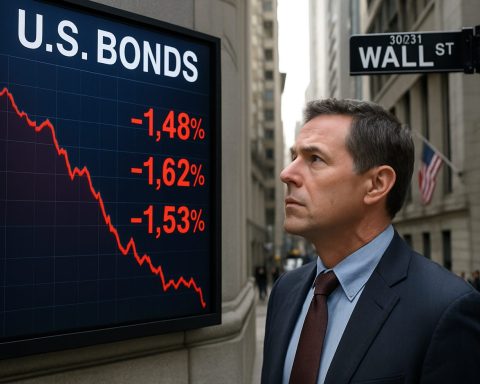- Quantum computing is gaining renewed interest, with stock rebounds following Nvidia’s CEO shifting views on its practical potential.
- D-Wave captivates the market with a market valuation of over £2.8 billion, despite modest revenues, sparking debates on valuation.
- The sector is compared to early AI developments, where initial enthusiasm met with tempered expectations after fiscal realities set in.
- The potential and risks of quantum are highlighted, particularly its ability to both revolutionise industries and amplify cyber threats.
- Quantum computing remains a speculative domain, with enthusiasts and sceptics debating its future as a groundbreaking technology.
- The discourse suggests that success will favour those exercising a blend of optimism and discernment in approaching quantum investments.
Once shrouded in mystery, the world of quantum computing has unfolded its cloak just enough to reveal tantalising glimpses of a potential future—one where computational power propels humanity into a new era of technology. Recently, quantum stocks have made a surprising rebound after Nvidia’s cautiously toned Quantum Day sent ripples of disappointment through the market. Nvidia’s CEO, Jensen Huang, initially cast doubt on the timeline for practical quantum computing, but he has now shifted gears, inviting experts to correct his earlier scepticism. This volte-face has caught the attention of both investors and tech enthusiasts alike, sparking renewed interest in quantum’s possibilities.
At the heart of this fervour lies the enigmatic D-Wave, the company commanding headlines with its staggering market valuation north of £2.8 billion. This figure belies its relatively modest revenue, stirring debates about whether such high stakes are justified. As investors watch their stakes oscillate, a burning question persists: Is there a real-world application for quantum computing that justifies the hype—and the price? The allure of quantum computing often feels more like a compelling sci-fi narrative than a tangible business prospect.
In recent discussions, tech leaders and investors alike compare the nascent stage of quantum to the meteoric rise of AI. When ChatGPT burst onto the scene, triumphant headlines hailed it as a groundbreaking tool, only for fiscal reality to temper expectations. The quantum sector has yet to reach that watershed moment of public adoption—the point where this innovative technology migrates from laboratory curiosity to commercial powerhouse. Instead, quantum remains the domain of fervent evangelists who sing its praises without concrete returns to bolster their tune.
Yet, not everyone is content to wait idly by. Conversations with seasoned experts, including a former NSA deputy director turned venture capitalist, have highlighted the dual-edged sword of quantum’s power. While its potential to revolutionise industries is undeniable, so too is its capability to amplify cyber threats. This very paradox—a technology with the power to protect and to undermine—forms the crux of the investment conundrum. How does one quantify an investment in a tool that could both safeguard and endanger?
Ultimately, the narrative surrounding quantum computing is as fractal as the science itself. Enthusiasts and sceptics are bound in a dance of anticipation and caution, each pondering whether to stake their claim in what might be the next tectonic shift in technology. The vibrant discourse offers a takeaway as compelling as any: In the rapidly accelerating world of technology, fortune may not just favour the brave, but the wise who tread with both optimism and discernment.
Quantum Computing’s New Dawn: What Investors Need to Know
The Current State of Quantum Computing
Quantum computing, once a niche curiosity, is gradually unfurling possibilities that could disrupt industries ranging from cryptography to pharmaceuticals. While companies like D-Wave are buzzing with investor interest, substantial questions remain about the practical applications of quantum technology.
Real-World Applications of Quantum Computing
1. Cryptography: Quantum computers could crack traditional encryption methods, compelling the need for quantum-resistant algorithms. Simultaneously, they offer new encryption methods leveraging quantum mechanics, providing unprecedented security.
2. Pharmaceuticals: Quantum computing can simulate molecular structures and interactions with high precision, accelerating drug discovery processes that are computationally prohibitive with classical computers.
3. Optimisation Problems: Quantum computing excels in solving complex optimisation dilemmas, like those found in logistics and supply chains, potentially saving billions of pounds in operational costs.
4. Financial Modelling: Markets that rely on the rapid analysis of vast datasets could benefit from quantum capabilities, which can efficiently handle complicated financial models.
How-To Navigate Quantum Investments
1. Understand Stages: Recognise that quantum computing is a developing field akin to early AI. Investing requires patience and understanding that applications will evolve over time.
2. Diversify: Invest in ancillary technologies and supportive industries, like quantum software startups or companies focused on quantum encryption.
3. Stay Informed: Regularly consult expert analyses and forecasts to track the progress and breakthroughs in quantum technology.
Industry Trends and Market Forecast
– According to various expert opinions, the quantum computing market is expected to grow from £472 million in 2021 to £1.7 billion by 2026 (source: MarketsandMarkets). Strategic partnerships between tech giants and academia are expected to accelerate this growth.
– Emerging trends suggest a shift towards hybrid models, integrating classical and quantum computing solutions, enhancing current systems as a transition strategy until full quantum computing becomes feasible.
Quantum Computing: Challenges and Controversies
– Controversy Over Hype: Despite significant investment, actual applications of quantum computing remain limited, reminiscent of early stages in AI development.
– Security Concerns: Quantum’s potential to breach current encryption poses a paradox; while it heralds advanced security developments, it simultaneously opens vulnerabilities in existing systems.
Quantum Computing vs. AI: A Comparative Review
– Development Stage: Quantum computing is where AI was a decade ago. Like AI, its potential is enormous, but actual implementations are scarce and experimental.
– Resource Demands: Quantum computers demand specialised, unstable environments for operations, whereas AI has become accessible through cloud computing.
Actionable Recommendations
– Educate: Engage with online courses or resources on quantum computing fundamentals to grasp core concepts and implications.
– Strategise Investments: Focus on companies demonstrating practical innovations or forming strategic partnerships geared toward real-world applications.
– Monitor Regulations: Stay updated on regulatory developments, as quantum computing poses unique legal and ethical considerations.
Conclusion
While quantum computing teeters between excitement and scepticism, the wise approach involves cautious optimism and strategic foresight. Staying informed and diversifying investments can place investors in solid standing as this transformative technology evolves.
For more holistic insights into the quantum realm, visit D-Wave Systems to explore ongoing advancements in quantum computing.







